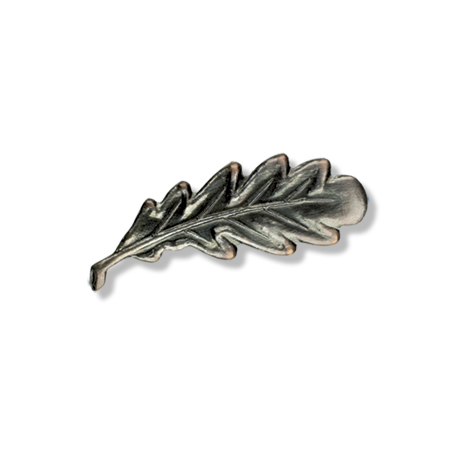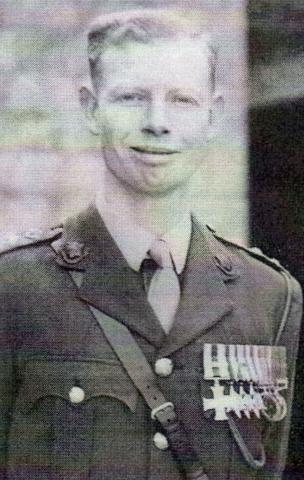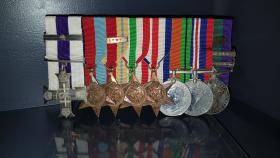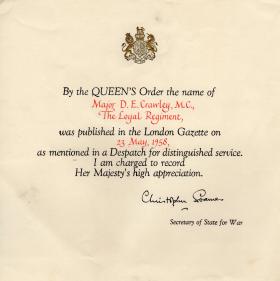Douglas Crawley was renowned for his gallantry, courage and masterful leadership as an officer of the Parachute Regiment and Loyal Regiment whom he served between 1939 – 1975. He fought in France and Belgium as an officer of the Loyal Regiment prior to being evacuated at Dunkirk. In the September of 1941 he joined 2nd Parachute Battalion, after which he served in North Africa, winning his first Military Cross at Oudna, and then went on to fight in the invasion of Sicily and the Battle of Arnhem, where he was made prisoner of war and was subsequently awarded a Bar to his Military Cross. Following the War Crawley continued to serve the regiment, being deployed to Palestine, with in 1954 transferring back to the Loyal Regiment and went on to serve in Korea and lastly Malaya; where he was mentioned in dispatches. On his return to the United Kingdom, Crawley taught at the Royal Military Academy, Sandhurst before retiring in 1975.
Douglas Crawley’s military career started when he was commissioned into the Loyal Regiment from the Officer Cadet Training Unit, Royal Military College, Sandhurst on the 22nd of October 1939, at the age of just 19 years. Not long after he embarked for France as a part of the British Expeditionary Force (BEF) and remained in the BEF until the force disbanded following the Dunkirk evacuation in 1940. In April 1941, Crawley was promoted to Lieutenant and in the September of that year, having volunteered for the Parachute Regiment, he joined B Company of the 2nd Battalion.
On the 29th of November 1942, Crawley made his first operational jump at Depienne with the 2nd Battalion during the Tunisian Campaign. Their objective was to destroy all enemy aircraft at two German airfields; Depienne and Oudna, and then link up with ground forces of the British 1st Army pushing towards Tunis. On landing at Depienne it became apparent that the airfield was abandoned, the Battalion proceeded to march towards their second objective – Oudna. By around midday of the 30th the battalion overlooked the airfield at Oudna and then proceeded to advance on it, only to discover that like Depienne, it was abandoned. The battalion then came under attack from armour supported by ground attack aircraft. The attack was repelled and the battalion proceeded to move to a stronger defensive position – awaiting relief from 1st Army. In this new position the battalion observed a convoy leaving Oudna, heading towards them. The battalion set an ambush, however, it was sprung too early, only destroying a single vehicle. For the second time that day, the battalion came under heavy attack, but again the battalion held the enemy off.
On the morning on the 1st of December the battalion learned that relief from 1st Army was not going to arrive; the ground offensive on Tunis had halted due to experiencing unexpectedly heavy resistance. This left the battalion trapped some 40 miles behind enemy lines. With the battalion now dangerously weakened by enemy fire and running low on ammunition, the order was given to destroy their mortars and radios and to move into the hills, where the battalion would commence a fighting-retreat to Allied lines. In moving to the hills, the battalion yet again came under heavy, repeated, attack from armour.
The events that immediately followed resulted in Lieutenant Crawley being awarded the Military Cross; his citation reads: “On the afternoon of the 1st December, 1942, this officer was in command of a platoon which was heavily engaged with the enemy in the hills called DJ ST BOU HADJEBA (Map Ref TUNIS K 0527). The platoon was on the right flank of the Battalion and the enemy repeatedly attacked the position. During the action Lieutenant CRAWLEY was wounded in the head but continued to command his platoon and held his ground. Later he was again wounded and temporarily blinded, only then did he hand over his command and was led some forty miles to MEDJEZ EL BAB by a brother officer. Although suffering great pain he cheerfully encouraged his men.”.
Crawley recovered from his wounds in time to take part in the 1st Phase of The Battle of Tamera during the March of 1943. On the 5th of March the 2nd Battalion cleared a number of enemy positions before joining the rest of 1st Parachute Brigade two days later. The battalion took up defensive positions on a hill feature with steep sides to the south of the road known as Sidi Mohammed el Kassim, which was covered in cork oak woods.
The next morning, the now Temporary Captain Crawley along with the rest of 1st and 2nd Battalions found themselves under heavy attack from an enemy force of divisional strength. By the end of the day the brigade had managed to repel the enemy and took approximately 200 prisoners of war, however at a high cost. On the second day two companies from 1st Para suppported by armour made an attack along Sedjenane Road. On the 10th, the 1st & 2nd Battalions came under heavy attack once again and whilst managing to hold their positions, they did take heavy casualties; both battalions received reinforcements from 3rd Para. The next day, further heavy assaults on 1 & 2 Para brought the brigade to near breaking point, with two platoons managing to penetrate the weakened lines of 1st Para, launching an attack on the Battalion Headquarters. Whilst the Brigade was severely weakened, they managed to yet again fend off the attacks, capturing even more prisoners of war in doing so; by the 12th the Brigade had captured approximately 300 prisoners of war.
Over the coming week the Brigade came under repeated bombardment and infantry attack. One-by-one the three parachute battalions were relieved, with 2nd Battalion being the last on the 18th. Whilst against all odds, the defence had been successful, that success had come at a high cost; over the 10 days ending on the 18th, the 2nd Parachute Battalion alone took approximately 150 casualties. During the battle all but one officers remained unscathed within B Company. Consequently, Crawley became Acting Major of B Company.
At Arnhem, "B" Company acted as the 2nd Battalion's reserve, and at 7pm on the first day, Frost called them forward to deal with an enemy force located on Den Brink, the high ground overlooking the west of the town. Crawley ordered the veteran Lieutenant Cane and his No.6 Platoon to move up the hill, but as they were doing so they came under fire and Cane and several others were killed. Deciding to allocate this task to Cane was something that Crawley regretted long after the war, he felt that a less experienced officer than he may have proceeded more cautiously. "B" Company were unable to evict the Germans from this area, but they kept them occupied until nightfall when they were not able to fire on the 2nd Battalion's column moving along the "Lion" Route.
In the darkness, having wasted enough time on Den Brink, Doug Crawley moved his men to their main objective, the pontoon bridge less than a mile from the main road bridge. Reconnaissance photographs had revealed on the previous day that the centre section of the pontoon had been dismantled, but "B" Company were hopeful of improvising a crossing to the southern bank, from where they would be able to mount an attack on the southern end of Arnhem Bridge. However no satisfactory means of any kind could be found to put them across. After the 2nd Battalion at the bridge had fought off Graebner's attack on Monday morning, radio contact was at last established with "B" Company and Crawley asked whether he should abandon the pontoon. Frost agreed and told him to bring his company to the bridge to strengthen its defence. This was by no means an easy manoeuvre as German resistance had stiffened considerably overnight and so "B" Company had to fight hard before they eventually reached Frost's force. In the process, most of Lieutenant Levien's No.4 Platoon had become cut off and were forced to fight on alone until, 24 hours later, they had to surrender through lack of ammunition. Only about 70 men of "B" Company men made it to the Bridge.
Managing "B" Company during the Battle had its difficulties, namely the lack of commanders for the platoons. Both Crawley and his Second-in-Command, Captain Hoyer-Millar, were unwounded, however Lieutenant Cane had been killed, Lieutenant Levien and most of his No.4 Platoon had been taken prisoner, Lieutenant Stanford was badly wounded, and many of the senior Sergeants and other obvious replacements were similarly out of action. A little relief, in the shape of Major Tate of Headquarters Company, arrived on Monday afternoon to take over No.6 Platoon.
Writing years later of the Dutch owners of the houses in which "B" Company were fighting, Crawley said: "By the night of 18/19 September I decided that the civilians remaining in the cellars of the houses which my company occupied must go elsewhere as we were obviously in for a protracted battle. About eight of them went out into the dark street under a Red Cross flag, quietly resigned to the possibility of fire being opened upon them. The house owner shook my hand and said "Thank you for coming. Please use the food we have left in the cellar". The party went slowly and safely over the street and out of sight to heaven knows where. The next morning, a stretcher party with a wounded man and under a Red Cross flag was shot up crossing the same street. The house was burned out the following night."
Due to the absence of Brigadier Lathbury, Lt-Colonel Frost was given command of all the units at the Bridge and in turn gave command of the 2nd Battalion to his Second, Major Wallis. When Wallis was killed on Monday night, Frost handed command to Major Tatham-Warter. Crawley was slightly resentful of this as his commission was senior to that of Tatham-Warter, as was his experience, but Frost made the decision on the basis that both men were equally capable and that Crawley had only just arrived at the Bridge, whereas Tatham-Warter had been there since Sunday evening and was therefore far more in touch with the situation.
On Tuesday, John Frost made his way over to "B" Company and instructed Crawley to send two men over to the eastern side of the bridge to deliver a verbal message to the 1st Parachute Squadron. Corporal Chilton and Private Goodwin were chosen for this most dangerous task, but on the way they were forced to seek shelter from a mortar barrage in a building, which turned out to be a Smithy. They crawled beneath the forge to shelter amongst the coke until the fire eased off, but in the process they realised that the smith was clearly prone to mixing his own faeces in with the coke. When they reported back to Major Crawley, he held his nose and when he had heard what they had to say, "...quite plainly told us to piss off and get a bloody bath! As if there were any baths around."
At about 13:30 on Wednesday afternoon, Frost and Major Crawley were talking outside of "B" Company HQ when a mortar landed beside them and blew them both off their feet. Luckily neither man was killed, but they were both wounded. "Lieutenant Colonel Frost, then commanding the mixed party at the bridge, and myself, then commanding the remnants of 2 Para, were discussing our positions not long after daybreak, 20 September. We were in a back garden behind the houses occupied by our men, when a small mortar bomb exploded beside us. We both bought it in the ankles and I had an extra bit in the right arm. We were bandaged up by the medical officer, Captain Jimmy Logan, and put into the cellar of the Brigade HQ house."
Frost recalled that, despite his wound, Crawley never made any sound or gesture to convey discomfort. He had no memory of it, but Crawley had insisted that when they had both been wounded, Frost had said "There you go again. Always getting wounded. What a silly ass I was to come and talk to you in the middle of a battle".
Later that day, all the wounded were evacuated from the fiercely burning buildings and were left in the care of the Germans. Frost said to Crawley "Well, Doug, I'm afraid we haven't got away with it this time", and he replied "No, sir, but we gave 'em a damn good run for their money".
For his actions at Arnhem, Doug Crawley received a second Military Cross. His citation reads:
"From the 17th to the 20th of September 1944 this officer commanded B Company. On the way into Arnhem in Holland the battalion was held up by the enemy on the high ground on the outskirts. Major CRAWLEY was ordered to deal with the opposition, which he succeeded in doing so effectively that the remainder of the battalion had little difficulty in reaching their objectives. Communications being faulty, he had to use his own judgement as to when to proceed to his final objectives. With great skill and leadership he disengaged his Company in the darkness and seized the North end of the pontoon bridge. Enemy attempts to recapture this area were severely dealt with. On Monday 18th, Major Crawley was ordered to leave the pontoon bridge and to move to the main bridge. He conducted this operation with great determination and arrived at the main bridge with prisoners and enemy weapons. Later the same day he led a small patrol back to the pontoon bridge in the hope of contacting reinforcements. Throughout the remainder of the battle he was continuously directing the defence of his sector, leading local counter attacks and reconnoitering fresh positions as building after building was destroyed by fire. He was a splendid example, his courage, leadership and skill were of a very high order."
Following his release from captivity in 1945, Doug Crawley met Doreen Specht, a Canadian and Red Cross ambulance driver, the two would later marry. After serving in Palestine, he spent four years as an instructor at Sandhurst, followed by three years at Staff College before renewing his acquaintance, in Trieste in 1954, with the Loyal Regiment.
Crawley then served in the Korean War as a staff officer, and later was Second-in-Command of the 1st Loyals in Malaya, where he was Mentioned in Despatches. Promoted to Lieutenant-Colonel, he continued to lead this Battalion in Germany. Douglas Crawley retired from the army in 1975, he died in 1986.
In tribute to him, John Frost wrote, "His decorations for gallantry only barely reflect his conduct in battle. He was imperturbable in trouble and great fun to be with at all times. His old friends and comrades will miss him greatly but will always be thankful that we knew him."
By Matthew Broad with information courtesy of the Pegasus Archive.
Read More







Latest Comments
There are currently no comments for this content.
Add Comment
In order to add comments you must be registered with ParaData.
If you are currently a ParaData member please login.
If you are not currently a ParaData member but wish to get involved please register.